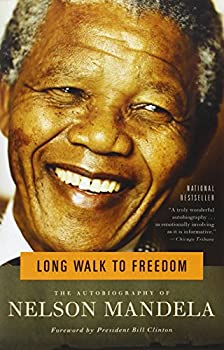Mandela, Nelson: Long Walk to Freedom

Nelson Mandela recognized timeless truths during his decades of imprisonment. Among them (1) that there are many who “preferred that the country descend into civil war rather than have majority rule by peaceful means”; and (2) “To make peace with an enemy one must work with that enemy [as he did with F. W. de Klerk with whom he later shared the Nobel]. He was 44 when he entered his last confinement, 71 when he was released. He did not doubt the path he had chosen, “but in attempting to serve my people, I found that I was prevented from fulfilling my obligations as a son, a brother, a father, and a husband.” He maintained his sanity (and so much more), surviving not only the incarceration of his wife, but the deaths of his mother and son.
There were also unexpected moments of humor:
- Newspapers were forbidden, but visited once by an unwary minister [Brother September], one of the prisoners asked if he might lead the prayer. Delighted by the prisoner’s piety, Brother September stepped aside, but when the prisoner asked the congregation to close their eyes and pray another prisoner stole a newspaper from Brother September’s briefcase.
- Mandela had an album of photographs sent by his family which circulated among the prisoners only to return with photographs missing. Mandela was bighearted enough not to begrudge personal photographs to prisoners who received no letters and had no other contact with the outside world—but on one occasion, when he agreed to send a photograph to one of the inmates, he was cautioned: “Look, don’t send me a photograph of the old lady [his wife, Winnie]. Send me one of the young girls, Zindzi or Zeni [his daughters]—remember, not the old lady!”
- On an earlier occasion when ANC members (including Mandela) were being arrested, one [Wilton Mkwayi] got separated from the others. When he returned to the fold, the policeman ordered him to leave. When he said he was one of the prisoners, the policeman called him a liar and threatened to arrest him for obstruction of justice—at which point Wilton Mkwayi was smart enough to shrug his shoulders and walk away!
Mandela and I both read War and Peace, he during his years of isolation, I (for the second time) during the months of quarantine, and neither of us missed a movie with Sophia Loren if we could help it. That is, unfortunately, as much as I can claim in common with the great man, but reading his book made me want to rededicate myself to my personal pursuits with all my focus and intelligence.
His final release, perhaps the most overwhelming moment in the book, had me choking for breath: “At first, I could not really make out what was going on in front of us, but when I was within one hundred fifty feet or so, I saw a tremendous commotion and a great crowd of people: hundreds of photographers and television cameras and newspeople as well as several thousand wellwishers. I was astounded and a little bit alarmed. I had truly not expected such a scene; at most, I had imagined that there would be several dozen people, mainly the warders and their families. But this proved to be only the beginning; I realized we had not thoroughly prepared for all that was about to happen.
“Within twenty feet or so of the gate, the cameras started clicking, a noise that sounded like some great herd of metallic beasts. Reporters started shouting questions; television crews began crowding in; ANC supporters were yelling and cheering. It was a happy, if slightly disorienting chaos. When a television crew thrust a long, dark, furry object at me, I recoiled slightly, wondering if it were some newfangled weapon developed while I was in prison. Winnie informed me that it was a microphone.
“When I was among the crowd I raised my right fist and there was a roar. I had not been able to do that for twenty-seven years and it gave me a surge of strength and joy. As I finally walked through those gates to enter a car on the other side, I felt—even at the age of seventy-one—that my life was beginning anew. My ten thousand days of imprisonment were over.”